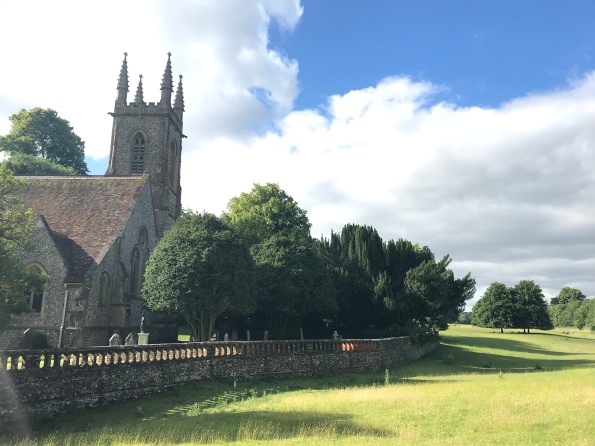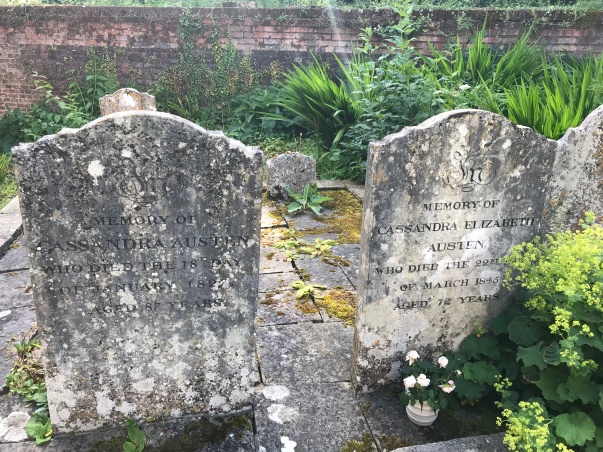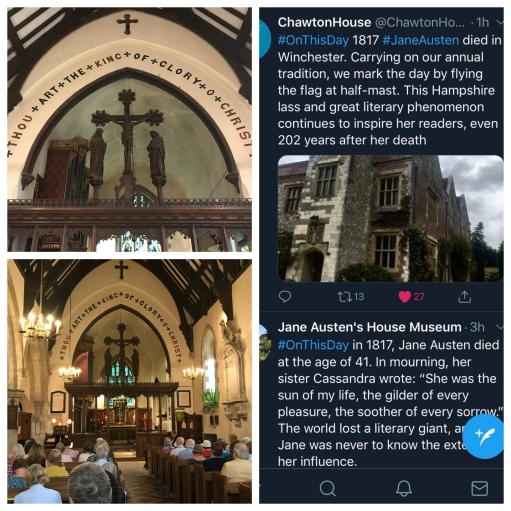Ah, l’aimable Jane!

This is a blog where, recipe-by-recipe, I re-create the famous French meals popularized by Julia Child, including her Chef Boyardee. Oh wait, that’s been done before! Instead, this is a blog where I leak top-secret government files and document my time spent inside the Ecuadorian embassy while on roller-skates. Rats, it’s all been done before!
No, no, this is a blog where I document a four-week research trip to Austenland in Hampshire, England. Please don’t tell me to “keep calm” — tranquillity is overrated — but I’ll allow this, just this once:
If you’re still reading, you haven’t clicked away because you’re (1) a fan of Austen, (2) a close family member of mine, or (3) someone with a browser that froze. If you fall into the third category, and especially if you own a PC, just throw a heating blanket over the monitor and hope for the best.
Welcome to Austen-Leaks or, better yet, Wiki-Darcy. What do you call a cat-lover’s version of an Austen novel? Answer: Purr-suasion.
Whatever you call it, this is a blog that begins on the Butts, the Butts Road in Alton, England, that is. This is the only English-speaking country on the face of the earth — didn’t they invent English, after all, with the help of Beowulf, or was it Virginia Woolf? — that can label a street “Butts Road” without a hint of self-consciousness. Please do not wake up the Butts! They need their rest. The Butts family tree is available upon request. It’s in my back pocket.

New to the area, I originally thought that a family with the most unfortunate of surnames resides in this house but, alas, the Butts takes you toward Chawton Village where one of the world’s greatest storytellers lived for the last eight years of her life. Her name was Mary Shelley – oh wait, Mary Shelley was the subject of my first book. This blog, and germinating second book, is about Jane Austen (1775-1817). Thanks to the sponsorship of The Jane Austen Society of America, I was awarded the international visitor position for a research trip. That’s the academic version of solitary confinement but the cuisine is better. But this is England, folks, so just barely.
Today the lovely and welcoming people at Chawton even made me a name tag – Colin Carman, Ph.D. J.A.S.N.A. I.V.P. (yeah, you know me) – so it’s official. (The more abbreviations after your name, the more useless you are in everyday life. Once my car broke down, so I sold it to the roadside assistant and just drove off in his; it was a Geo.) There’s even a slight discount on sandwiches and tea in the dining room.
Today, I offered a potato chip to the house dog – Toby (photo-ready below) – who came by the table where I was taking notes, but he didn’t want the chip. Could he be cuter? Having two Labrador Retrievers back in the States, I was shocked to meet a dog that actually refused a table scrap. Our dogs will eat anything that doesn’t eat them first. I also had a clearer head today, on my second day in Hampshire, than I did on my first day: jet-lag, a discount on Cornish ales in the pub just down the road from the room I rented, et cetera. Toby remains unimpressed.

Before I got a real job at the univ, I maintained this blog and wrote film reviews. I also taught yoga, which means your life is pretty much going nowhere fast. I take that back: you can achieve nirvana but also bankruptcy. You see, watching films and reading literary fiction are my two favorite past times but to really drum-up traffic, on Twitter or in the blogosphere, you have to really (and contentiously) engage with other bloggers and Tweeters and I haven’t the time. This is called “dragging,” as in “Oooh, don’t drag me, bro.” You won’t find me in many comments sections as it’s a rather giant W.O.T. (or, waste of time). That was five or so years ago, before I taught a course on Jane Austen at my home university, Colorado Mesa University, and before I wrote a book about Mary Shelley, her poet-husband Percy Bysshe Shelley, and their engagement with the natural world. Thank you to my alma mater for providing me with unlimited shower caps for life.
Having spent a lot of time reading and thinking about the English Romantics, I thought it might be wise to shift my focus to another Romantic heavyweight, Jane Austen, and sustain my interest in environmentalist philosophy. Austen is generally thought to be a “social” writer and chronicler of nineteenth-century courtship and marriage. She is still unfairly pegged as a “woman writer” with “feminine” interests but we’ll return to that misconception later on. I can’t help myself, so here is a Shelleyan collage from last summer when I visited Mary Shelley’s grave in Bournemouth. Check out the guy who photobombed my pic. He actually growled at me to get out the way. The only requirement at the Shelley gravesite is that you don’t rob it, and that’s not a lot to ask! Oh and don’t plug the corpse into any available outlet.
 For now, here are four important facts about Jane Austen, her life and works.
For now, here are four important facts about Jane Austen, her life and works.
#1. Jane Austen was the seventh of eight children and her only sister Cassandra’s junior by two years. They had five brothers, which meant sizable Tesco bills for their father, the Reverend George Austen and his wife Cassandra. Three sons in three years: good grief! Here is Mrs. Austen’s grave in the churchyard just below the manor house owned by the Austen sisters’ older (and considerably richer) brother Edward. Every good writer needs a benefactor, after all! The third eldest of the Austen boys, Edward was adopted by the very wealthy cousins of his father, the Knight family, which meant that his financial situation went from black to white, or day to Knight, in the blink of an eye. I have a pretty wealthy uncle myself — he invented the surgical glove two centuries ago — but he hasn’t yet put me on the payroll. Uncle Nathan, stop acting like you have a new phone and responding: “Who dis? New phone.” You can only use that excuse twice.

The year 1808 was a bad year for Edward’s wife, who died, but a good year for the unmarried Austen sisters who wasted no time in moving from Southampton to Chawton. The former place is the port city where a little-known vessel called the Titanic embarked on its fatally frosty voyage. The Titanic, as you know, did not live up to its illustrious name but that’s the just the tip of the iceberg. Two years prior to the death of Edward’s wife, the Austens gathered in Chawton and by 1809, they made this tiny village in the west country their home.
The two Cassandras, Jane’s sister and mother, are interred adjacent to the sanctuary of Saint Nicholas, which you can see jutting out from the trees below. This is a stone-built chapel dating from the thirteenth century. Jane’s father officiated for thirty years at Saint Nick’s, which is 870 fewer years than the yew tree has stood outside and, at one time, held the keys to the front door inside. Remember to lock the doors tightly, so the swallows don’t conduct their own service. But don’t be such a cassandra about it! Not the end-of-the-world. Why are mother and daughter buried side-by-side? I’ll look into that. What do you call a cremated Romantic? (I don’t have a punchline for that one, so feel free to contribute in the comments.) Are you asleep already? For the textual equivalent of Melatonin, here is my book on the Shelleys.

#2. A tad more biography: before Christmas in 1775, Jane was born to her clergyman father during a bitterly cold stretch of winter, so cold, in fact, that lambs froze in the fields. Lamb shoulder is a thing in the UK, btw. Do they have shoulders, really? Were lamb shoulder pads a thing in the 1980s? Reverend Austen, who had forfeited his scholarship at Oxford University, because he wished to start a family with Cassandra, walked in the snow to lay holly at Saint Nicholas and to serve the sacrament. This was soon after his second and youngest daughter was born at home, without the aid of a physician (common for the time period), and christened at Steventon Rectory. Jane Austen’s birthplace has been since torn down. I was born and raised in New Jersey, which means that my baptismal font served a dual function as a punch bowl at Dunkin’ Donuts.
#3. Jane Austen isn’t simply a proper English writer but, by now, an industry unto herself. In fact, her novels could easily rival that single work of her contemporary, Mary Shelley, in terms of screen time. There are more than one hundred Frankenstein-inspired films – “Frankenweenie” anyone? – and nearly that many loosely based on Austen’s fiction. There’s even Pride and Prejudice with Zombies, a book that can be judged by its cover since the title is the most memorable part. I’m currently re-writing a work of J.D. Salinger’s, tentatively called The Catcher in the Rye with Zombies, so Brian Grazer or other Hollywood producers, if you’re out there, just shoot me an email and it’s yours. It’s too bad she predates movie royalties. She and Cassandra would travel by donkey — no joke — to Alton to get groceries; had she lived to see her novels’ success on screen, the sisters would have traveled by Tesla and thrown their candy wrappers out the window.
#4. Jane Austen only saw real success during the last seven years of her short but productive life; she likely died of Addison’s Disease but the cause of death remains a debate in medical history. Adrenal failure is certainly no fun; what is fun is this little tidbit: when Austen completed a draft of what would become her most popular novel, Pride and Prejudice, she was just twenty years old (only one year older than Mary Shelley when she composed Frankenstein) though she would not see the novel in print for another thirty seven years! And you thought your pointless doctoral dissertation on apiarian promiscuity in the works of Margaret Atwood was taking forever! This means that Austen was same age as her classic heroine, the strong-willed Elizabeth Bennet, when she wrote it and nearly as old as Eliza’s mother when it finally reached the reading public in 1813. From there, she lived like a Romantic-era rock star: sex, drugs, and rock n’ roll. Actually, no, that was Lord Byron’s job and the unmarried Austen lived out her days without children, or, as I like to say, “child-free.” In fact, she regarded her novels as her children and, having gotten a taste of success, remarked that the success of Pride and Prejudice and Sense and Sensibility “only makes me long for more.” Get it, girl!
Speaking of longing, I need some much-needed sleep and that Cornish ale I mentioned before, so, for now, c’est moi inside the private reading room in the Chawton Library. I’m sensitive about my big shiny forehead because I keep my brains in there. Thus, there is no comments section. This place has really gone to the dogs if they (Toby, included) let the likes of me in! I kid, of course, as this blog is at times irreverent. It’s the Shelleyist in me to not respect authority. And it’s the Janeite in you that, I hope, will keep you reading about this research trip. Toby will also be contributing.
Thanks again to the lovely people at Chawton House! They seem so happy, and as my uncle Jim put it, why wouldn’t they be!? As we stupidly reply to obvious statements, in the States, “Right?!?”

Onward! PS: What does Morrissey think of Jane Austen? His far-right stances as of late have me worried for his mental health and, worse yet, I bought tickets to see him in Utah in September. But back to Jane…










 For now, here are four important facts about Jane Austen, her life and works.
For now, here are four important facts about Jane Austen, her life and works.

